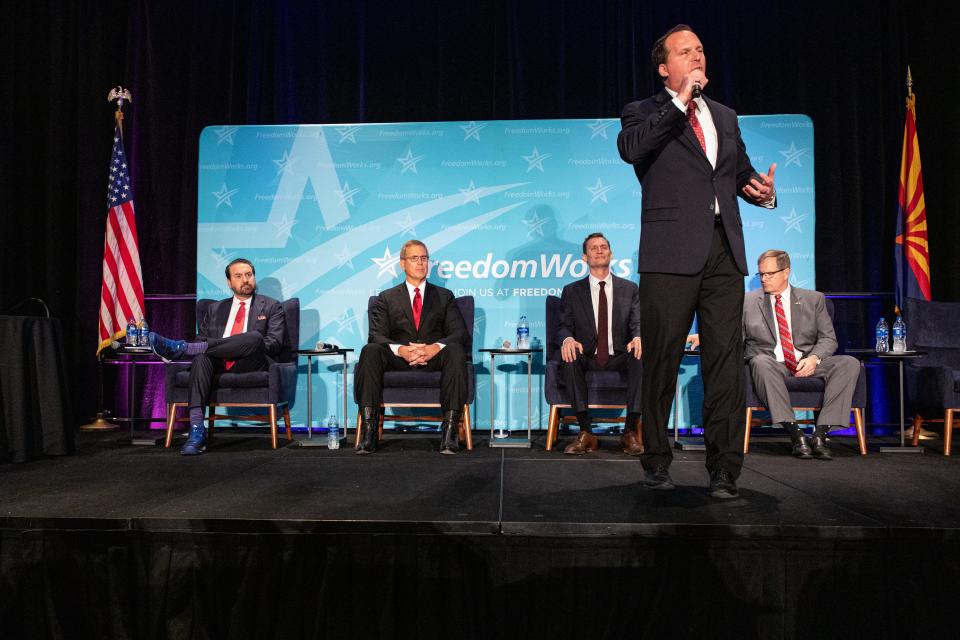Blake Masters wins Arizona's Republican Senate primary and faces Democratic Sen. Mark Kelly
- Oops!Something went wrong.Please try again later.
- Oops!Something went wrong.Please try again later.
- Oops!Something went wrong.Please try again later.
- Oops!Something went wrong.Please try again later.
Blake Masters, a protégé of billionaire Peter Thiel and former President Donald Trump’s pick for Arizona’s U.S. Senate seat, defeated his challengers and gives the state its first Trump-style Senate candidate on the November ballot.
Unofficial results were in line with recent public polling that showed the Tucson resident took command of a previously tight race after receiving Trump’s backing in June.
In Masters, Arizona Republicans picked a conservative more rhetorically combative than former Sen. Martha McSally, R-Ariz., who lost consecutive races in 2018 and 2020 to give the state its first pair of Democratic senators since 1953.
Jim Lamon, the founder of Depcom Power, an Arizona-based solar company, finished in second place. Arizona Attorney General Mark Brnovich narrowly edged out Michael “Mick” McGuire, the retired adjutant general of the Arizona National Guard. Arizona Corporation Commission member Justin Olson finished last.
Masters’ victory hands the Republican nomination to a first-time politician whose youth and aggressive brand of conservatism stand in contrast to the low-key centrism embodied by incumbent Sen. Mark Kelly, D-Ariz.
Election coverage: Live updates across Arizona | Arizona election results
The nonpartisan Cook Political Report immediately rated the matchup between Masters and Kelly a toss-up in a race that could help determine control of the Senate.
With the Senate evenly divided between 50 Republicans and 50 people who vote with Democrats, and after a pair of Democratic Senate wins in Arizona, the state’s Republican primary took on even more importance.
Lamon tapped heavily into his personal fortune in a failed bid for Trump’s support but continued to cast himself as the person best suited to pursue Trump’s unfinished agenda.
Brnovich won statewide office twice but rarely received attention during the Senate campaign except when Trump publicly pressured him to legitimize Trump’s false claims that the state’s 2020 election was “rigged.” When Brnovich didn’t, the former president called him a “disappointment.”
McGuire brought a lengthy military record and a less-angry approach to the race. The former fighter pilot suggested that his background makes him the ideal choice to stand against Kelly, a former astronaut.
On the issues: What Arizona's US Senate candidates are saying about abortion rights
Olson pitched himself as a former state lawmaker who has won statewide office already. The former chief financial officer for conservative Turning Point USA said he has helped the state settle on balanced budgets and pushed for conservative values for years.
For Republicans, the Arizona’s Senate primary offers a new measure of Trump’s continued dominance of GOP politics and a new test of Democratic wins in 2018 and 2020. In those elections, Kelly and Sen. Kyrsten Sinema, D-Ariz., both defeated former Sen. Martha McSally, R-Ariz.
McSally won the Republican primary in 2018 and lost to Sinema. In 2020, Kelly defeated McSally after Gov. Doug Ducey appointed her to the seat once held by the late Sen. John McCain, R-Ariz.
Arizona’s two Democratic senators are a first for the state since 1953.
From the outset of the 2022 cycle, Republican Senate contenders called for a different kind of nominee.
Lamon was the first to enter the Senate race in May 2021. He spent his own money aggressively to court Trump’s support and lavished financial support on other Republicans and conservative causes, such as the review of Maricopa County’s presidential ballots in 2021, as well.
McGuire joined the race in June 2021. Two days later, Brnovich, who had pondered a gubernatorial bid as well, jumped into the Senate race.
Masters made his long-anticipated entry in July 2021.
His campaign began with the audacious backing of Thiel, who promised $10 million in support to a political-action committee that would support Masters. Over time, Thiel would actually spend at least $15 million to help Masters. Thiel provided similar backing for J.D. Vance, the Republican nominee in Ohio’s Senate race.
In October, Olson entered the race, but it did little to calm concerns in Washington that Republicans still hadn’t found a candidate who could excite and unite the GOP base.
From the start, speculation about other candidates hung over the race.
Rep. Andy Biggs, R-Ariz., considered making a run before quietly opting against it. Ducey was seen as a strong possibility, but he, too, took a pass.
Throughout, Trump cast the longest shadow over the field.

In a July 2021 rally in Phoenix, Trump pressured Brnovich to use the ballot review that was winding down to lend credence to his false claims of a stolen election. With Trump’s endorsement in the race hanging in the balance, his words took on even greater weight.
“We have to hold these people accountable,” Trump said at the time. “Hopefully — and I say this, and I have confidence in it — hopefully, your attorney general, Mark Brnovich ... will take this incredible information given by these incredible warriors and patriots, and he’s going to take it and he’s going to do what everybody knows needs to be done.”
Brnovich’s office opened an investigation after the ballot review ended in September 2021, but didn’t bring major cases stemming from the probe.
In April, Brnovich took the rare step of releasing an initial investigative report that cited “serious vulnerabilities” and “questions” about the election but didn’t claim widespread fraud.
Two months later, Trump endorsed Masters and blasted Brnovich.
Brnovich appeared repeatedly on Fox News with an approving Sean Hannity but otherwise ran a low-profile campaign. On Monday, the day before the GOP primary, Brnovich publicly wrote that his office had only found one instance of a ballot turned in for someone who had already died out of 282 alleged identified by the Senate's ballot review.
By contrast, Masters blended heated social media posts with personal appearances that played well with a wide swath of conservatives. Lamon spent big on ads appearing on screens all over.

Election guide: 2022 primaries
Election results |Congressional races | State races |Mayor, city council races|How to vote
In the final weeks of the campaign, the candidates held a pair of events putting most of them on stage at the same time for voters to consider.
By that time, Masters had secured Trump’s endorsement — and the critical attacks that go with it. Brnovich and Lamon in particular hit Masters as a tool for Thiel and the technology industry that many conservatives view warily.
At a June candidate forum, Brnovich accused Masters of being “beholden to an industry.”
“The last thing we need to take on Big Tech is somebody from Big Tech,” Lamon charged.
Masters responded that he knows the industry better than anyone and offered specific steps, such as rolling back legal protections for social media companies, to defuse the issue.
Brnovich skipped a July forum, along with Olson. Lamon and Masters traded insults throughout that event.

Listen to The Gaggle
Available on Apple Podcasts, Spotify and Stitcher. Turn on notifications to be alerted when a new episode is released.
Reach the reporter Ronald J. Hansen at ronald.hansen@arizonarepublic.com or 602-444-4493. Follow him on Twitter @ronaldjhansen.
Support local journalism. Subscribe to azcentral.com today.
Subscribe to our free political podcast, The Gaggle.
This article originally appeared on Arizona Republic: Trump-endorsed Blake Masters wins Arizona GOP Senate primary

